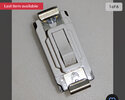Been to have a very quick look at an RCBO tripping fault today. So far haven’t had anything in bits or done any testing so I have no idea what is causing it.
The symptom is that the RCBO trips most times when the lights are switched off in one of the rooms. The lights switch on fine and stay on as long as they are left alone. As soon as you switch them off the RCBO trips.
The installation is in a bowling clubhouse. The installation is original fit from the mid 1970s and is T&E buried in the fabric of the building. The room which has the issue has 3no. 100W 8ft fluorescent tubes on the ceiling and is controlled by a single one way MK grid switch.
 (This type)
(This type)
There are lights in 4 other rooms on the same circuit which I think work fine.
The dist board is a 6 way single phase Schneider acti9 board supplying two circuits. The lights and sockets. This board is a few months old and installed to replace an old wylex BS3036 two way. It is fed in SWA from a panel board in the main building remote to the clubhouse. I believe this fault has existed since the board was installed (not by me)
The lights are fed from a B6A Schneider PoN type A RCBO.
I think you now know as much as me so will be interesting to see your guesses and what tests you think will highlight the problem!
The symptom is that the RCBO trips most times when the lights are switched off in one of the rooms. The lights switch on fine and stay on as long as they are left alone. As soon as you switch them off the RCBO trips.
The installation is in a bowling clubhouse. The installation is original fit from the mid 1970s and is T&E buried in the fabric of the building. The room which has the issue has 3no. 100W 8ft fluorescent tubes on the ceiling and is controlled by a single one way MK grid switch.
 (This type)
(This type)There are lights in 4 other rooms on the same circuit which I think work fine.
The dist board is a 6 way single phase Schneider acti9 board supplying two circuits. The lights and sockets. This board is a few months old and installed to replace an old wylex BS3036 two way. It is fed in SWA from a panel board in the main building remote to the clubhouse. I believe this fault has existed since the board was installed (not by me)
The lights are fed from a B6A Schneider PoN type A RCBO.
I think you now know as much as me so will be interesting to see your guesses and what tests you think will highlight the problem!




